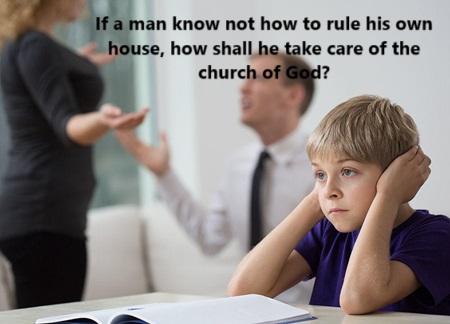The Work of Elders
The Work of Elders
The office of the elders, in addition to what was said in Article 16 to be their duty in common with the minister of the Word, is to take heed that the ministers, together with their fellow elders and deacons, faithfully discharge their office, and both before and after the Lord's Supper, as time and circumstances may demand, for the edification of the churches, to visit the families of the congregation, in order particularly to comfort and instruct the members, and also to exhort others in respect to the Christian religion.
Church Order, Art. 23

Several articles in the Church Order describe the duties of elders. Article 16 calls the elders “…to exercise church discipline and to see to it that everything is done decently and in good order.” Article 55 speaks of the elders' calling to “…ward off false doctrines and errors that multiply exceedingly through heretical writings…” Article 64 refers to the calling of the elders to supervise the administration of the Lord's Supper. Article 81 speaks of the elders' involvement in censura morum.
Of all these articles, Article 23 is intended to be a brief description of the work to which God calls elders. The article speaks of the calling of the elders in the government and discipline of the church. Mention is made of the supervision by the elders of their fellow officebearers. The role of the elders in conducting family visitation is referred to. The work of the elders in “evangelism” is also mentioned: “…and also to exhort others in respect to, the Christian religion.” Not mentioned but worth noting is the pastoral work in which the elders ought also to be involved.
Government and Discipline⤒🔗
The first duty of the elders referred to in Article 23 is “…what was said in Article 16 to be their duty in common with the minister of the Word…” The duty enjoined jointly to the ministers and the elders by Article 16 is “…to exercise church discipline and to see to it that everything is done decently and in good order.” The very first duty of the elders, therefore, is the government and discipline of the church.
It is the plain teaching of Scripture, and a foundation stone of Reformed church government, that the office of the elders is the rule of the congregation. One of the common Greek words used in the New Testament to refer to the office of elder makes this clear. That word is episkopos and means “overseer” or “superintendent,” and is commonly translated as “bishop” (cf. Philippians 1:1; 1 Timothy 3:2; Titus 1:7). An elder is an “overseer,” that is, one who watches over the lives and souls of the members of the church.
That the work of the elders is the rule of the congregation is also plain from many passages of Scripture which describe this office. The following are a sampling:
-
1 Timothy 3:5, “For if a man know not how to rule his own house, how shall he take care of the church of God?”
-
1 Timothy 5:17, “Let the elders that rule well be counted worthy of double honor, especially they who labor in the word and doctrine.”
-
Acts 20:28, “Take heed therefore unto yourselves, and to all the flock over the which the Holy Ghost hath made you overseers, to feed the church of God, which He hath purchased with His Own blood.”
-
Hebrews 13:7, “Remember them which have the rule over you, who have spoken unto you the Word of God: whose faith follow, considering the end of their conversation.”
-
Hebrews 13:17, “Obey them that have the rule over you, and submit yourselves…”
-
1 Thessalonians 5:12, “And we beseech you, brethren, to know them which labor among you, and are over you in the Lord…”

The government of the church is listed in the Reformed “Form of Ordination of Elders and Deacons” as the first duty of elders.
Therefore, in the first place, the office of the elders is, together with the ministers of the Word, to take the oversight of the Church, which is committed to them, and diligently to look, whether every one properly deports himself in his confession and conversation; to admonish those who behave disorderly, and to prevent, as much as possible, the sacraments from being profaned: also to act (according to the Christian discipline) against the impenitent, and to receive the penitent again into the bosom of the Church…
The Government of the Elders is Twofold←⤒🔗
-
First, the elders are to have supervision over the material goods of the church. This includes several things. It includes that the elders have supervision over what we commonly refer to as the “General Fund.” It includes that the elders have supervision over the property of the church, especially the church building and grounds. It includes oversight of the official records and archives of the congregation.
This does not mean that the consistory may not appoint committees and helpers out of the congregation to assist in this work. This is not only permitted, but often desirable. Even then, however, such persons and committees remain responsible to the consistory.
-
Secondly, the supervision of the elders applies especially to the spiritual life of the congregation. Generally, the elders are to see to it that “…everything is done decently and in good order.” Specifically, the elders are to exercise Christian discipline. (More will be said about the elders' main work of Christian discipline in Articles 71-85; which deal with “Censure and Ecclesiastical Admonition.”)
Supervision of Fellow Officebearers←⤒🔗
The second main duty of the elders is “… to take heed that the ministers, together with their fellow-elders and the deacons, faithfully discharge their office…”
Not only do the elders have supervision over the congregation, but they are also to take heed to their fellow-elders, as well as to the minister and the deacons. What is referred to here is the mutual supervision officebearers are called to exercise among themselves. This was mentioned as part of the calling of the minister in Article 16. This is also referred to in the “Questions for Church Visitation.” It is this duty of mutual supervision that underlies the practice of censura morum, outlined in Article 81.
Particularly are the elders to assume supervision of the office of the ministry. The minister is not a law unto himself in the congregation. Nor ought the elders to be intimidated by the minister. Before God and for the benefit of the church they are to have oversight of the minister's walk of life, as well as his public teaching and preaching in the congregation. All of his ministerial labors are subject to the oversight of the elders.
Not only is this brought out in Article 23, but this is also pointed out in the “Form of Ordination of Elders and Deacons.”

It is also the duty (of the elders) particularly to have regard unto the doctrine and conversation of the ministers of the Word, to the end that all things may be directed to the edification of the Church; and that no strange doctrine be taught…
This same supervision also includes the walk of life and official labors of the other elders and of the deacons.
Evangelism←⤒🔗
Article 23 also mentions as one of the duties of the elders that they “…exhort others in respect to the Christian religion.” By “others” the reference is to those who are non-church members. The reference, therefore, is to church extension work or local evangelism.
The elders have a responsibility here. Just because this is a vital aspect of the work of the local church, it belongs to their supervision of the church. The elders must be active in this work. They must promote this work and themselves participate in it.
One of the questions asked of the consistory at the annual church visitation touches this aspect of the work of the elders: “Is the congregation busy in the extension of God's kingdom, especially in. the promotion of missions, to the best of its ability?”
Usually this work will be carried on by a Church Extension Committee or an Evangelism Committee. The work of such a committee is under the supervision of the consistory. It is advisable that the eldership be represented among the membership of such a committee.
Pastoral Work←⤒🔗
It also belongs to the work of the elders that they be involved in the pastoral work of visiting the sick and shut-ins, and providing counsel to those struggling with various spiritual problems.
Although our present article speaks only in passing of the elders' calling “to comfort” the members of the church, this aspect of their work ought not to be slighted. Certainly the minister and the deacons have a calling here, as we have noticed in the past. But, very clearly, so do the elders.
Earlier church orders spelled this duty out more carefully.
-
Synod of Wezel, 1568: “The elders furthermore should remember that it also pertains to their office to visit and comfort the sick in accordance with their calling… that they not only uplift the sick with the things that are necessary for the sustenance of their lives, but also cheer them up by comforting them.”
-
Synod of Dordtrecht, 1574: “Visiting the sick belongs to the office of the ministers of the Word, and it is risky to assign other persons to that task. Therefore, the ministers shall request the elders and deacons to help them with their task. They shall do so because their office in comparison with other Christians requires more with respect to visiting, comforting, and strengthening the sick, the poor, and members in need of comfort.”
One of the questions asked at the annual church visitation is: “Do the elders visit the sick and others in agreement with the calling of their office?”
One passage of Scripture that clearly brings-out this aspect of the calling of the elders is James 5:13, 14:
Is any sick among you? Let him call for the elders of the church; and let them pray over him, anointing him with oil in the name of the Lord. And the prayer of faith shall save the sick, and the Lord shall raise him up; and if he have committed sins, they shall be forgiven him.1
 ←⤒🔗
←⤒🔗
Varia←⤒🔗
The question is sometimes raised whether or not it is proper that an elder be paid for his services. Generally elders and deacons carry out the duties of their office without being paid. However, in special cases, as for example in a large congregation where an elder may be appointed by the consistory to be especially devoted to sick visitation, an elder may be paid for his work. In this case he is unable to pursue an ordinary living. The consistory then may compensate him for his work.
Article 23 must not be understood as providing an exhaustive list of the duties of the elders. Besides the duties mentioned in the article, these may be added: visiting and supervising catechism classes, teaching catechism, leading worship services when necessary conducting consistory and congregational meetings when necessary, attending classis and synod, and serving on classical and synodical committees.

Add new comment